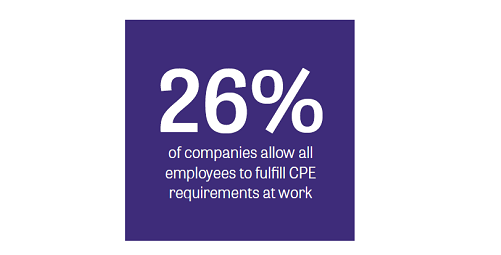TD Magazine Article
Certification Requirements Are Not Allowed While on the Clock
Only 26 percent of chief financial officers say that their companies let all employees fulfill continuing professional education (CPE) requirements at work.
Fri Sep 01 2017

Although many firms talk about putting in the work to have the best group of employees around, a significant number don't back that up. You'd think that if an organization was truly committed to equipping its workers with the best knowledge and skills possible, it would allow them to dedicate at least a few hours each year to achieving or maintaining certifications around their jobs.
However, according to a survey from Robert Half Finance & Accounting, only 26 percent of chief financial officers say that their companies let all employees fulfill continuing professional education (CPE) requirements at work. Meanwhile, 24 percent only allow some employees to do this on a regular basis, and 50 percent rarely or never let their people take any classes during business hours.
At some types of organizations, such as hospitals, certain groups of employees need to fulfill continuing education requirements to continue legally working. Take nurses, for example. A registered nurse in the state of California must complete at least 30 hours of continuing education for each renewal of his license, according to PearlsReview.com, an educational content website for nurses.
So, in that case, allowing people to complete CPEs at work would lend a hospital two key advantages. First, it would increase the organization's likelihood of having a workforce that complies with state laws and regulations. Second, it might make itself a more attractive employment destination than another hospital that doesn't allow nurses to fulfill their CPEs while on the clock.
Who'd pass up those opportunities?

